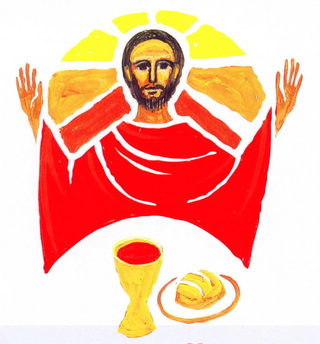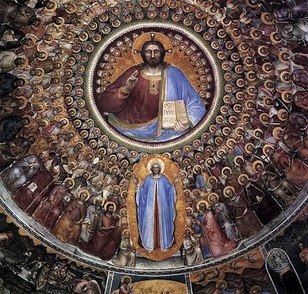|
As far back as there has been a Church, Christians have celebrated Holy Communion together. This meal constitutes the central practice of our faith. We come as a collection of diverse, broken, needy individuals and are transformed in this sacrament into the Body of Christ through God's grace. It is at once something miraculous and something incredibly ordinary. At Our Redeemer's Lutheran Church, we celebrate Holy Communion twice a month during regular worship, on the first and third Sundays of the month. We also celebrate Holy Communion on special holidays like Christmas and Easter and at our monthly Chapel Communion service. For more information on worship times, please visit our worship page.
ThanksgivingAnother name for Holy Communion is the Eucharist. "Eucharist" (pronounced "YOO-car-ist") comes from a Greek word meaning "thanksgiving." Much like the holiday Americans celebrate in November, the Eucharist is a meal which reminds us of God's great gift of forgiveness of sins and eternal life, made available to us through Jesus Christ. We believe that in this meal, through the common elements of bread and wine, we receive these gifts of God. Each celebration of Holy Communion is an opportunity for us to come to God's table and to be given once again everything we need to live and thrive in God's love.
|
Open Communion, Open TableIn the Evangelical Lutheran Church in America, we practice open communion. This means that everyone and anyone, regardless of what denomination you belong to or which congregation you attend, or even if you are not a church-goer at all, you are welcome to the table with us. Holy Communion is a celebration of God's grace given to us through Jesus Christ, who started this practice and instituted the sacrament. Our celebration of Holy Communion is based on Jesus' Last Supper with his disciples where he took bread and wine, blessed them, and gave them to his disciples, telling them to continue this practice "in remembrance of me." He did not require a doctrinal test or confession of faith before he fed them at that meal, simply asked them to eat and drink. Likewise, we invite all people to join us at God's table and receive the unasked for, undeserved gift of God's grace given to us through common bread and wine.
|
"Take and eat, this is my body given for you... Drink this, all of you. This is my blood poured out for you and for all people for the forgiveness of sins. Do this in remembrance of me."
|
Flesh and Blood, Bread and Wine
Some Christians believe that in the meal, the elements cease to be bread and wine and are transformed into the physical body and blood of Jesus. Other Christians believe that the bread and wine are symbols which remind us of his body and blood. Lutherans are somewhere in between. We believe that the bread and wine remain bread and wine, but that in some way which transcends our understanding, Jesus Christ is present "in, with and under" the bread and wine in the same true, real way which he was present on the cross. The figure on the cross was not a symbol of God's son, but the man himself. It was his real, actual death and his real, actual resurrection through which we have been saved, and it is his real, actual presence in the meal which gives us the gifts of forgiveness for sins and abundant life. It is Jesus Christ and him alone who can give us these gifts, and it is his presence in the bread and wine—not our belief, merit, participation, repentance or the position of the person serving the meal—that makes this holy meal a sacrament.
A Meal Across Space and TimeChrist's presence in the Eucharist is not the only mysterious element of this meal. On some level, every celebration of the Lord's Supper is the same celebration of the Lord's supper—every meal is the same meal. We believe that when we gather at the Lord's table, we are gathering together before God for a "foretaste of the feast to come" in the next life. This means that every gathering everywhere is all of us gathering together; and not just everywhere, but everywhen. As we come together to share the sacrament of the table, we join with all Christians, past and present, near and far. We gather with our ancestors and our descendants all around one table with Christ at the head. Many Christians find great meaning in this meal for that reason. We gather with loved ones whom we have lost and wait to see after the resurrection. We gather with the saints of old and with friends and family with whom we cannot be present because of distance or other obstacles. No matter what barriers keep us apart here, be they physical, emotional, spiritual or anything else, all those barriers are broken down in the Lord's Supper, and we become one community—one body—in Christ.
|


